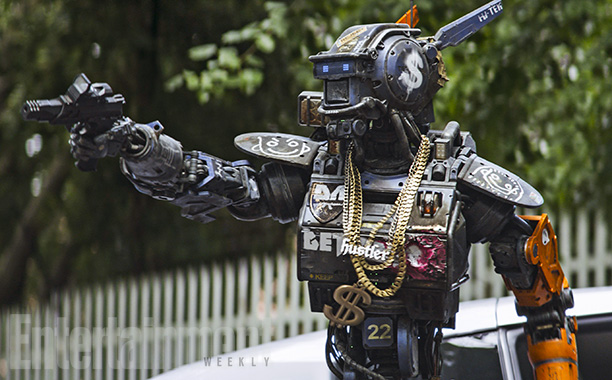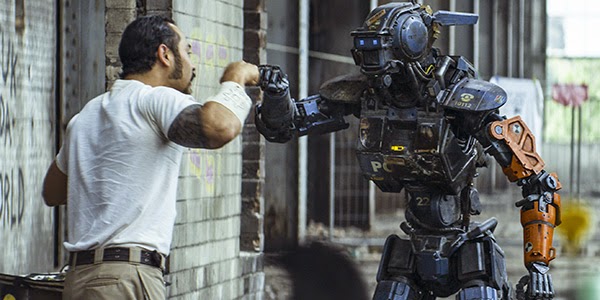Genre: Sci-fi
Premise: In the near future, an engineer creates an artificially intelligent robot. But when a group of criminals kidnap the robot and use it for their own nefarious purposes, things go downhill.
About: Neill Blomkamp was plucked out of obscurity by the then biggest director in the world, Peter Jackson, to direct the Halo movie. While at first skeptical, audience reaction changed when Blomkamp’s test movies and short films leaked online. The young auteur had a knack for creating amazing special effects on tiny budgets. Halo didn’t happen but that turned out to be a blessing in disguise when Blomkamp switched gears and gave us an original film instead, District 9. With no stars and an unfamiliar setting (South Africa), box office trackers dismissed it. The film would open with a shocking 40 million dollars on its opening weekend, though, and a new Hollywood golden boy was born. Blomkamp immediately went to work on his next film, Elysium, this time with a budget 5 times as big as District 9 (I’m sure a lot of that went to Matt Damon). Blomkamp reportedly clashed with the Hollywood-style of filmmaking, voicing frustrations after the fact that there were some people out to get him. Whatever the case, the film did okay (around $100 million) but wasn’t loved by fans or critics nearly as much as District 9. Chappie seems to be Blomkamp going back to his roots, returning to South Africa and doing this one away from the system. Unfortunately, the film is not getting the kind of attention he hoped for. It’s currently at 30% on Rotten Tomatoes, and only made $13 million this weekend, its inaugural frame.
Writers: Neill Blomkamp and Terri Tatchell
Details: 120 minutes
I’m one of those people who thought District 9 was borderline genius. It not only took a dated idea and turned it on its head (instead of aliens coming to earth and attacking us, they came here and we enslaved them), but it took a huge risk in how it presented its story, doing so in a documentary format. To take an “artsy” approach on a summer blockbuster is unheard of. As if that wasn’t enough, D9 made its lead character extremely unlikable. I’ll never forget one of the earliest scenes in that film where Wikus delights in the sound of a bunch of alien baby eggs popping after the military sets them on fire.
So I was a little confused when Elysium came out. District 9 felt so deep and extensive. Elysium’s story was so half-baked, I’m surprised Ben and Jerry didn’t sponsor it. Surprisingly, Blomkamp admitted as much in a recent interview, where he copped to falling in love with the imagery of this space station above earth and not really thinking beyond that. The fallout from that decision inspired him to re-hire his co-writer from District 9, Teri Tatchell, for Chappie. This one was going to be different, Blomkamp demanded. And it was. But was it different good or different bad?
Gangsters Ninja and Yolandi need to come up with 20 million dollars in 7 days or a much bigger gangster will kill them. Their idea is to kidnap the lead engineer of the city’s robotic police program, Deon, then hold the city hostage with his power over the robots until they pay up.
It just so happens that when they kidnap Deon, he’s working on a new experiment – the first fully A.I. robot. Ninja and Yolandi change their plan, figuring they can teach this robot to become a gangster and help them pull off a mega-heist.
They quickly name the robot, “Chappie,” and start raising it like a child. Chappie is torn in multiple directions as Deon tries to teach it art, Yolandi tries to teach it compassion, and Ninja tries to teach it to kill. Ninja wins out, convincing Chappie to help him with the heist. But when Chappie learns that the battery inside of him will expire in five days and he’ll be gone forever, he must rethink his priorities, including what it means to be alive.
The first thing I’ll give Blomkamp credit for here is that he’s trying. This is a much more personal story for him than Elysium. And bringing on a real screenwriter has given the script a more polished feel than his last effort. We have clear goals here (pull off the heist), every character has a clear motivation, there are ticking time bombs (deadline to pay back the rival gangster).
Yet still, this feels a few drafts shy of what it’s trying to be. Let’s take a look at why.
NO MAIN CHARACTER
I was just talking about this on Friday. Who’s the main character in this screenplay? Is it Yolandi and Ninja? They’re treated more like plot points than people. Is it Deon? He’s definitely the most sympathetic, but he’s only occasionally around. Is it Chappie? Not really. We almost always see the scenes through the eyes of those around Chappie – not Chappie himself. So who’s the freaking protagonist here?
I’ll repeat this until the brads come home. AUDIENCES LIKE TO IDENTIFY WITH A SINGLE PERSON. They like to latch onto someone and see the story through their eyes. It gives them a sense of comfort. When you don’t give them that, it’s hard for them to connect with the story on an emotional level. It’s the difference between playing a video game and watching someone else play a video game. In one case, you are the character. In the other, you’re just watching a bunch of things happen. Go back and look at District 9. Is there any doubt who the main character was there?
STUCK IN ONE PLACE
Audiences don’t like being stuck in one place for too long UNLESS there’s an inherent desire to get out of that place or there’s sufficient enough conflict within that place to carry the story. Half this movie was four characters hanging around an old building talking. Chappie was learning. So, technically, we’re moving forward in that sense. But then we’d come back to the place and Chappie would learn again. Then we’d come back and Chappie would learn some more. We were never moving forward back at the building so it got boring fast. Look at E.T. E.T. wanted to go home. It was fun at Elliot’s house for awhile. But soon he realized he needed to get out of there – to go back to his ship and get home.
LAPSES OF LAZINESS
It’s never fun to weed out and solve those nagging smaller story problems. You’ve got the big ones taken care of, so the temptation is to call it a day. But if you really want your script to shine, you have to solve the small nagging issues.
Why, for example, is Deon allowed to LEAVE? This guy has access to every single cop in the entire city. Some might say he’s the most powerful man in the city. Yet Yolandi and Ninja are like, “Eh, leave us alone,” and kick him out!!?? That makes NO SENSE.
Then there’s this plot point where Chappie’s battery dies in five days. And this battery is “hard-wired” into him. So it’s not replaceable. Uhhhh… WHAT??? What about all the other robots walking around the city? How do they last for more than five days?
Guys, I know it’s less work to just ignore these things. And it’s true that one or two lazy lapses won’t get noticed by the average audience member. But three? Four? That’s when the audience starts picking up on the laziness. And once they sense that you’re not trying, they’ll never forgive you.
There’s one final problem with this script and it’s something we never talk about on the site because I rarely encounter it. This movie should not have been rated R. This is PG-13 subject matter all the way. It is about a ROBOT THAT LEARNS. There’s no way you can convince me that that storyline requires an R rating. Not only does it limit your box office, but it confuses your potential audience.
Case in point, I had a family sitting next to me with 2 young children (both around 6) who left midway through the film when a porno appeared on one of the character’s televisions. Obviously, that mom and dad saw a fun robot on a poster with the kid-friendly name, “Chappie,” and thought it’d be a perfect film for the family. Turning it into some hard-edged gang war confused everyone and, frankly, doesn’t make sense. So definitely know your subject matter and what kind of rating that’s going to inspire and write according to that rating.
[ ] what the hell did I just watch?
[x] wasn’t for me
[ ] worth the price of admission
[ ] impressive
[ ] genius
What I learned: A ticking time bomb can’t just be stated, it must be utilized. Ninja and Yolandi have 7 days to find their money or they will be killed (ticking time bomb) by another gangster. However, the two spend the next 90 minutes of the movie sitting around talking. Just STATING that a bomb is looming does not give one license to do nothing until said bomb goes off. Your characters must act in accordance with the looming threat. We must see the fire under their ass pushing them to desperately solve the problem. If you inject a ticking time bomb yet your characters never act like there’s a ticking time bomb, then it’s the same thing as not adding one at all.



